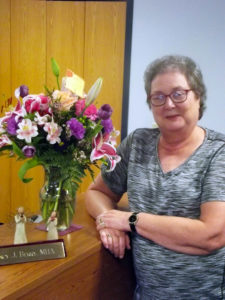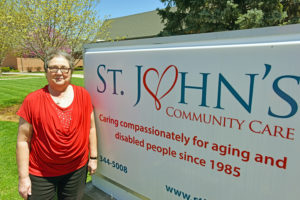St. John’s Community Care Founder Celebrates 30 Years of Compassion

Nancy Berry, director of St. John’s Community Care in Collinsville, Ill.
As the founder and executive director of Collinsville (Ill.)-based St. John’s Community Care reflects upon three decades of caring compassionately for aging and disabled individuals, Nancy Berry says the common thread is a desire to help not only the aged and disabled, but their caregivers, too.
Turning the clock back to 1983, two years before St. John’s Community Care came to be, an idea hatched in the hearts of members of the Healing Community Board at St. John Evangelical United Church of Christ in Collinsville, Ill. The idea was to care for homebound seniors. Also during that time, the growing church was seeking to raise funds to install an elevator to make Fellowship Hall under the sanctuary accessible.
The outreach ministry that would eventually be known as St. John’s Community Care already included a medical equipment loan closet and Meals on Wheels Team. In preparing to celebrate the successful capital campaign which raised enough funds for the new elevator, St. John Evangelical UCC invited a nationally respected cleric to speak at the dedication: the late Rev. Dr. Harold Wilke, a life-long UCC minister and a staunch disability advocate.
“Dr. Wilke commended us for the outreach our church was already doing to support disabled persons,” said Berry, “and he encouraged us to continue to look for additional ways to help because the need was so great and so many needed help right here in our own community. The same is true today.”
After performing a congregational needs survey, in July 1985 St. John EUCC officially formed the agency known as St. John’s Community Care to provide non-medical Home Services. At that time, Berry was already working in the field of healthcare administration and volunteering her time to chair the church’s Healing Community Board.
In 1988, Berry accepted the position of Executive Director. “From then until now, I’ve seen what we do as both an outreach ministry but also a business in an operational sense,” she said. “I’m comfortable with both of those identities. We’re faith-based, mission-driven and extremely focused.”
When Berry took over from the first Director, it was a part-time position supervising nine clients and nine part-time caregivers. The organization has grown to serve nearly 200 clients each year, plus 100 more through support groups and caregiver workshops.
Leap of Faith Creates Growth
In 2001 the church took a leap of faith and, thanks to the congregation’s capital campaign and the commitment of many construction volunteers, the current building became the new home for these ministries. The building enabled the addition of an adult day program in Collinsville as a respite for full-time caregivers and as a safe, loving alternative to nursing home care for aging and disabled adults.
Berry emphasizes that, since the beginning, the nonprofit organization has been focused on serving all members of the community, not exclusively church members. In 2013, St. John’s Community Care opened an additional adult day program site in Edwardsville. Today the outreach serves clients in nine Metro East communities including Caseyville, Collinsville, Edwardsville, Fairmont City, Fairview Heights, Glen Carbon, Granite City, Maryville and Troy.
 “On any given day we’re serving approximately 40 Home Services clients and 75 Adult Day Program participants in our two locations,” Berry said. ‘Our entire board of directors is comprised of St. John EUCC members. We continue to have such wonderful people on our board, each of whom has a unique talent in serving, as well as true compassion for those in need.”
“On any given day we’re serving approximately 40 Home Services clients and 75 Adult Day Program participants in our two locations,” Berry said. ‘Our entire board of directors is comprised of St. John EUCC members. We continue to have such wonderful people on our board, each of whom has a unique talent in serving, as well as true compassion for those in need.”
The average tenure of the organization’s staff, both full- and part-time, defies the industry average, according to Berry.
“We have a lot of long-term staff members at St. John’s Community Care,” she said, “several of whom have been with us for 25 years or more. That is particularly unusual with in-home care. Without a doubt, the common denominator among our dedicated staff – and really what keeps us here, doing what we do every day – is compassion. It’s a very rewarding place to work for the right people,” she added. “It’s so obvious that we’re helping people. We’ll have individuals come to our support group (for caregivers) for the first time, when almost always they’re exhausted, discouraged and feel as if they’re at the end of their rope. By the end of their first caregivers’ support session, they often cry with relief that they’re in a safe space and that they’re able to receive assistance and encouragement, not only from our staff but from fellow caregivers who are walking the same road that they are.”
Long-Term Adult Day Care Need on the Rise
St. John’s Community Care also recognizes the longevity of those for whom it provides care. “Our longest-term adult day client has been coming to us for more than 15 years,” Berry said. “It’s not unusual for clients to receive services from us for three years or more.”
“Our adult day program is truly a sanity break for the caregiver,” said Berry. “Being a caregiver is tough. In the words of First Lady Rosalynn Carter, ‘There are only four kinds of people in the world: those who have been caregivers, those who are currently caregivers, those who will be caregivers and those who will need caregivers.’ We provide a loving supportive, attentive environment that is very positive and inclusive. Families who initially hesitated in bringing their shy or withdrawn loved ones to us are amazed at what a difference it makes.”
Family members of aging and/or disabled loved ones are often hesitant to ask for any help or support as they embrace and fulfill the exhausting role of caregiving, Berry said. “Many times the caregivers are seniors themselves,” she said. “But once the caregiver is able to let go a little bit and trust us, it frees him or her for four, six or eight hours to go back to work, rest, or just to take care of his or her own needs.”
With aging Baby Boomers — the nation’s largest living adult generation — needing in-home and adult day services and with Millennials expected to outnumber Boomers by 2019, the need for this avenue of caregiving will increase exponentially, according to Berry. “My hope and prayer is that adult day services become understood and publicly funded better than they are currently,” she said. “For so many people, it fills their care need, it’s less expensive and it’s more rewarding when individuals are able to remain in their own home and retain a greater degree of independence. The need for what we offer will only increase as more and more Americans live longer.”
Much of what propels St. John’s Community Care’s services is tied to a spirit of philanthropy, according to Berry. She noted that the origin of the word hails from the Greek “philanthropos,” meaning love of mankind. “Our compassion for those whom we serve springs from our love of people,” she said. “That’s what inspires us and drives us daily to do what we do. We work hard at telling our story in ways that help people understand what a tangible difference their financial gifts make in people’s lives right here in the Metro East.”
As Berry celebrates two milestones this spring — her 30th anniversary with St. John’s Community Care and her 70th birthday — she is taking a rare moment to sit back and reflect on a lifetime of ministry and, in her words, a lifetime of blessings.
“I realize how much I’ve grown in my empathy and compassion, along with learning how important it is to be present for someone,” Berry said. “The little things we may think are inconsequential may be huge for our clients and their caregivers. Even if there are times when we cannot help them, just that we’ve listened and supported them is very, very important.”
Reprinted with permission from the Summer 2018 issue of St. John’s Community Care News.
Join Our Mailing LIst
"*" indicates required fields
Follow on Facebook
Denise Buck to Succeed Campbell as IFM CEO - CHHSM
www.chhsm.org
As IFM Community Medicine (IFM) Founder and CEO David Campbell M.D. plans to retire mid-year, his successor, Denise Buck M.D., has started working full-time with IFM in St. Louis. Before assuming this...